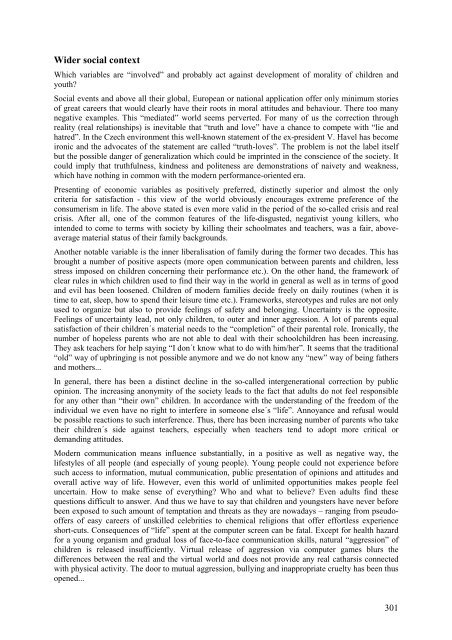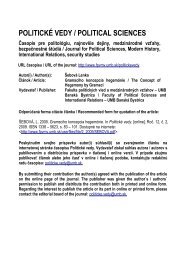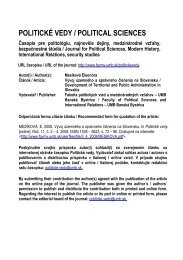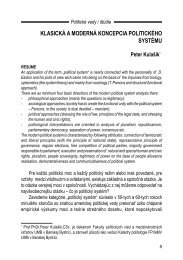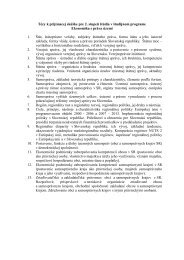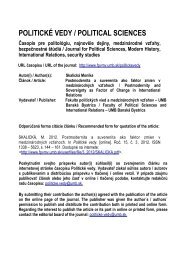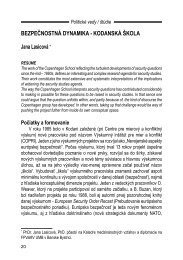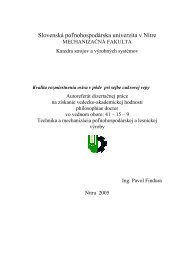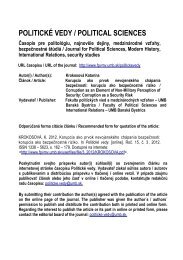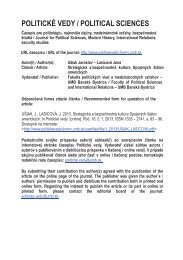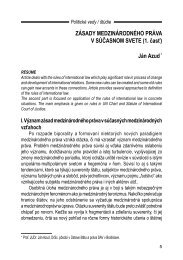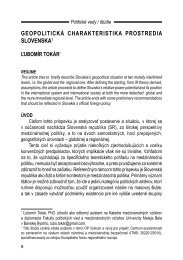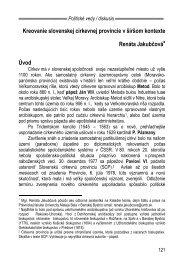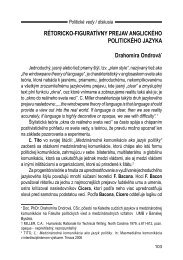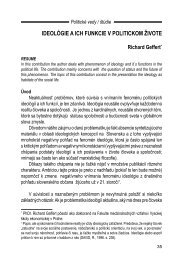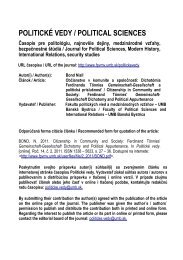MRAVNÃ VÃCHOVA V Å KOLÃCH NA SLOVENSKU A V ZAHRANI ÄÃ
MRAVNÃ VÃCHOVA V Å KOLÃCH NA SLOVENSKU A V ZAHRANI ÄÃ
MRAVNÃ VÃCHOVA V Å KOLÃCH NA SLOVENSKU A V ZAHRANI ÄÃ
Create successful ePaper yourself
Turn your PDF publications into a flip-book with our unique Google optimized e-Paper software.
Wider social context<br />
Which variables are “involved” and probably act against development of morality of children and<br />
youth<br />
Social events and above all their global, European or national application offer only minimum stories<br />
of great careers that would clearly have their roots in moral attitudes and behaviour. There too many<br />
negative examples. This “mediated” world seems perverted. For many of us the correction through<br />
reality (real relationships) is inevitable that “truth and love” have a chance to compete with “lie and<br />
hatred”. In the Czech environment this well-known statement of the ex-president V. Havel has become<br />
ironic and the advocates of the statement are called “truth-loves”. The problem is not the label itself<br />
but the possible danger of generalization which could be imprinted in the conscience of the society. It<br />
could imply that truthfulness, kindness and politeness are demonstrations of naivety and weakness,<br />
which have nothing in common with the modern performance-oriented era.<br />
Presenting of economic variables as positively preferred, distinctly superior and almost the only<br />
criteria for satisfaction - this view of the world obviously encourages extreme preference of the<br />
consumerism in life. The above stated is even more valid in the period of the so-called crisis and real<br />
crisis. After all, one of the common features of the life-disgusted, negativist young killers, who<br />
intended to come to terms with society by killing their schoolmates and teachers, was a fair, aboveaverage<br />
material status of their family backgrounds.<br />
Another notable variable is the inner liberalisation of family during the former two decades. This has<br />
brought a number of positive aspects (more open communication between parents and children, less<br />
stress imposed on children concerning their performance etc.). On the other hand, the framework of<br />
clear rules in which children used to find their way in the world in general as well as in terms of good<br />
and evil has been loosened. Children of modern families decide freely on daily routines (when it is<br />
time to eat, sleep, how to spend their leisure time etc.). Frameworks, stereotypes and rules are not only<br />
used to organize but also to provide feelings of safety and belonging. Uncertainty is the opposite.<br />
Feelings of uncertainty lead, not only children, to outer and inner aggression. A lot of parents equal<br />
satisfaction of their children´s material needs to the “completion” of their parental role. Ironically, the<br />
number of hopeless parents who are not able to deal with their schoolchildren has been increasing.<br />
They ask teachers for help saying “I don´t know what to do with him/her”. It seems that the traditional<br />
“old” way of upbringing is not possible anymore and we do not know any “new” way of being fathers<br />
and mothers...<br />
In general, there has been a distinct decline in the so-called intergenerational correction by public<br />
opinion. The increasing anonymity of the society leads to the fact that adults do not feel responsible<br />
for any other than “their own” children. In accordance with the understanding of the freedom of the<br />
individual we even have no right to interfere in someone else´s “life”. Annoyance and refusal would<br />
be possible reactions to such interference. Thus, there has been increasing number of parents who take<br />
their children´s side against teachers, especially when teachers tend to adopt more critical or<br />
demanding attitudes.<br />
Modern communication means influence substantially, in a positive as well as negative way, the<br />
lifestyles of all people (and especially of young people). Young people could not experience before<br />
such access to information, mutual communication, public presentation of opinions and attitudes and<br />
overall active way of life. However, even this world of unlimited opportunities makes people feel<br />
uncertain. How to make sense of everything Who and what to believe Even adults find these<br />
questions difficult to answer. And thus we have to say that children and youngsters have never before<br />
been exposed to such amount of temptation and threats as they are nowadays – ranging from pseudooffers<br />
of easy careers of unskilled celebrities to chemical religions that offer effortless experience<br />
short-cuts. Consequences of “life” spent at the computer screen can be fatal. Except for health hazard<br />
for a young organism and gradual loss of face-to-face communication skills, natural “aggression” of<br />
children is released insufficiently. Virtual release of aggression via computer games blurs the<br />
differences between the real and the virtual world and does not provide any real catharsis connected<br />
with physical activity. The door to mutual aggression, bullying and inappropriate cruelty has been thus<br />
opened...<br />
301


